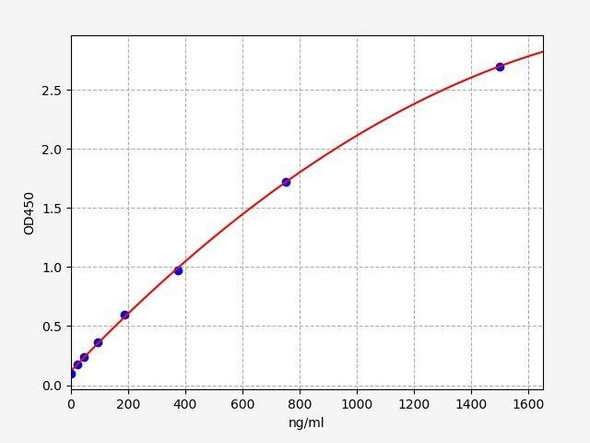Description
| Product Name: | Human Complement Factor H/CFH Recombinant Protein (His tag) |
| Product Code: | RPES6023 |
| Size: | 20µg |
| Species: | Human |
| Expression Host: | HEK293 Cells |
| Synonyms: | AHUS1, AMBP1, ARMD4, ARMS1, CFHL3, FH, FHL1, HF, HF1, HF2, HUS |
| Mol Mass: | 40.81 kDa |
| AP Mol Mass: | 60 kDa |
| Tag: | C-His |
| Purity: | > 95 % as determined by reducing SDS-PAGE. |
| Endotoxin Level: | Please contact us for more information. |
| Bio Activity: | Testing in progress |
| Sequence: | Ser860-Arg1231 |
| Accession: | P08603 |
| Storage: | Generally, lyophilized proteins are stable for up to 12 months when stored at -20 to -80°C. Reconstituted protein solution can be stored at 4-8°C for 2-7 days. Aliquots of reconstituted samples are stable at < -20°C for 3 months. |
| Shipping: | This product is provided as lyophilized powder which is shipped with ice packs. |
| Formulation: | Lyophilized from sterile PBS, pH 7.4. Normally 5 % - 8 % trehalose, mannitol and 0.01% Tween80 are added as protectants before lyophilization. Please refer to the specific buffer information in the printed manual. |
| Reconstitution: | Please refer to the printed manual for detailed information. |
| Background: | Complement factor H, also known as H factor 1, and CFH, is a sialic acid containing glycoprotein that plays an integral role in the regulation of the complement-mediated immune system that is involved in microbial defense, immune complex processing, and programmed cell death. Factor H protects host cells from injury resulting from unrestrained complement activation. CFH regulates complement activation on self cells by possessing both cofactor activity for the Factor I mediated C3b cleavage, and decay accelerating activity against the alternative pathway C3 convertase, C3bBb. CFH protects self cells from complement activation but not bacteria/viruses. Due to the central role that CFH plays in the regulation of complement, there are many clinical implications arrising from aberrant CFH activity. Mutations in the Factor H gene are associated with severe and diverse diseases including the rare renal disorders hemolytic uremic syndrome (HUS) and membranoproliferative glomerulonephritis (MPGN) also termed dense deposit disease (DDD), membranoproliferative glomuleronephritis type II or dense deposit disease, as well as the more frequent retinal disease age related macular degeneration (AMD). In addition to its complement regulatory activities, factor H has multiple physiological activities and 1) acts as an extracellular matrix component, 2) binds to cellular receptors of the integrin type, and 3) interacts with a wide selection of ligands, such as the C-reactive protein, thrombospondin, bone sialoprotein, osteopontin, and heparin. |






